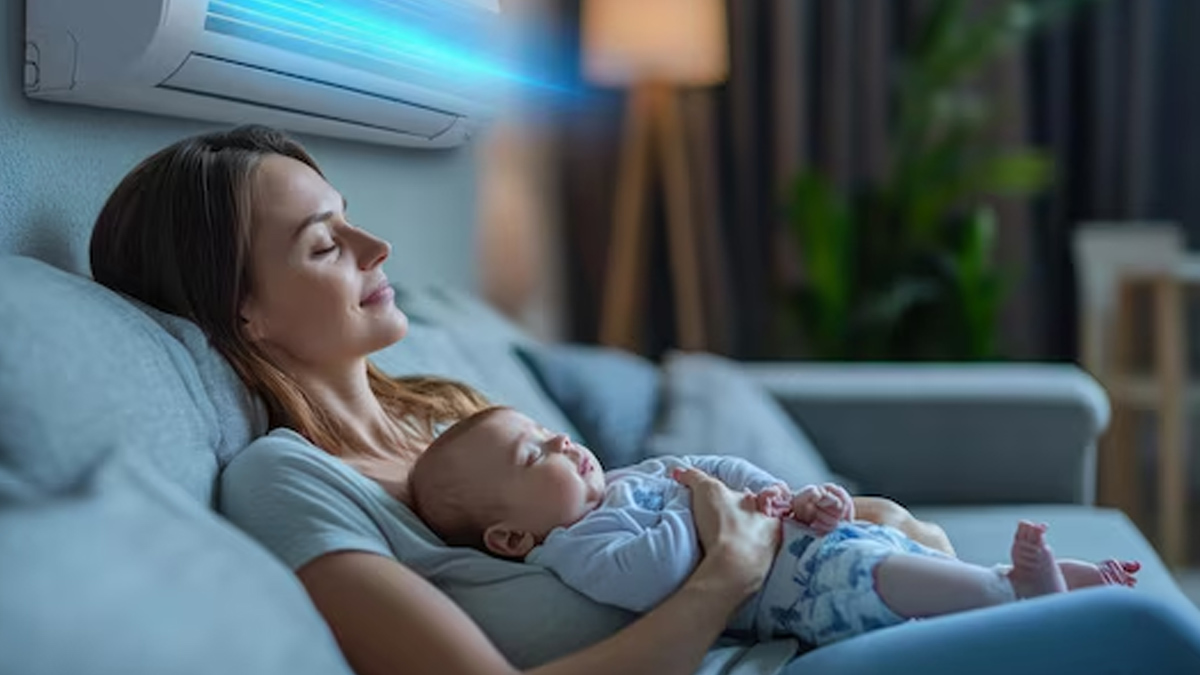
New parents often worry about keeping their newborns comfortable, especially during extreme weather. With summer temperatures rising, a common question pops up: Is it safe to use air conditioning (AC) for a newborn baby? While excessive heat can make babies fussy or dehydrated, improper use of AC might also pose risks. The good news? Experts confirm that AC is safe for infants if used correctly. The key lies in maintaining the right temperature, ensuring proper airflow, and taking steps to protect the baby’s delicate skin and health.
Table of Content:-
An expert breaks down expert-approved guidelines to help parents create a safe, comfortable environment for their little ones. Let’s explore the ideal temperature range, clothing tips, and essential precautions every caregiver should know.
Right Temperature of AC for Newborns?
View this post on Instagram
Dr Parul Khanna, Pediatrician, Meher Childcare Clinic, Pune, emphasises that AC can be used for newborns but requires careful adjustments. "It’s very hot outside. New moms often ask if they can turn on the AC in the baby’s room. Yes, you can—but keep some things in mind," she says. Below are a few key recommendations from Dr Khanna:
- Set the AC between 24°C to 28°C (75°F–82°F). This range prevents overheating without making the room too cold.
- Avoid drastic temperature shifts between rooms.
- Dress the baby right and use soft, full-sleeve cotton clothes to keep the baby cosy. Avoid woollens, as they can cause overheating.
- For babies under one month, add cotton socks and a cap for extra warmth.
- Direct airflow is a no-no and ensure AC vents do not blow air directly onto the baby. This prevents chills and dryness.
- Service the AC before use to remove dust, bacteria, and mould. Dirty filters can harm a newborn’s developing immune system.
ALSO READ: Baby’s First Dental Care: Expert Tips for Newborn and Infant Oral Health
The Science Behind Temperature Control
-1742967174665.jpg)
A study in Pediatrics highlighted that room temperature significantly impacts infant comfort and safety. Researchers found that temperatures between 23°C–27°C (73°F–80°F) reduce the risk of Sudden Infant Death Syndrome (SIDS) and heat-related stress. Dr Khanna’s recommended range aligns with these findings, ensuring babies stay comfortable without compromising their health.
Tackling Dry Air from AC

- ACs reduce humidity, which can dry out a baby’s skin and nasal passages. Dr. Khanna advises:
- Moisturise Daily: Apply a gentle, fragrance-free moisturizer to the baby’s skin.
- Stay Hydrated: For babies under 6 months, increase breastfeeding or formula feeds.
- For babies over 6 months, offer water, coconut water, or hydrating fruits like watermelon.
- Use Saline Drops: If nasal dryness occurs, saline drops can soothe irritated membranes.
- Sudden temperature changes can shock a baby’s system.
- Turn off the AC 15 minutes before leaving. This allows the room temperature to normalise gradually.
ALSO READ: Is Honey Safe for Babies? Expert Explains the Dangers of Infant Botulism
Conclusion
Using an air conditioner for your newborn can be safe and beneficial during hot weather, as long as you follow the right precautions. Keep the temperature between 24°C–28°C, dress your baby in breathable cotton clothing, and ensure the AC airflow isn’t blowing directly on them. Regular AC maintenance, proper hydration, and moisturising of the baby’s skin will help counter dryness caused by cool air. By making these small adjustments, you can create a comfortable and healthy environment for your little one.
Also watch this video
How we keep this article up to date:
We work with experts and keep a close eye on the latest in health and wellness. Whenever there is a new research or helpful information, we update our articles with accurate and useful advice.
Current Version